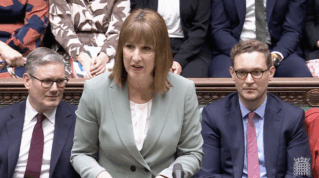Expanding the apprenticeship levy so that half of funding can be spent on other forms of training would limit the country to 140,000 apprenticeship starts per year, the government has claimed.
New Department for Education estimations for the plan, which has been proposed by the Labour Party in the buildup to the general election, state that doing so would cost an additional £1.5 billion.
Skills minister Robert Halfon revealed the forecast in an answer to a parliamentary question, tabled by Conservative MP Simon Jupp. He said it is “important that the apprenticeships budget remains ring-fenced for apprenticeships to ensure continued affordability of the programme”.
Labour leader Sir Keir Starmer last year announced his intention to reform the apprenticeship levy so that it can be spent on other types of training if the party comes into power.
It would be called the “growth and skills levy” and allow businesses to use 50 per cent of their funds to fund non-apprenticeship training. But experts have warned this would swallow up funding for small and medium-sized enterprises (SMEs) which are funded by the levy as well as large firms.
In June, then shadow skills minister Toby Perkins committed to additional spending for a ringfenced budget for apprenticeships in SMEs.
Halfon reiterated that in the last two financial years, an average 98 per cent of the Department for Education’s apprenticeships budget was spent.
He said: “If employers were able to use 25 per cent of their levy funds for non-apprenticeships training, the department estimates that this would create an additional cost of up to approximately £700 million per annum.
“Allowing employers to use up to 50 per cent of their funds for non-apprenticeship training would increase this cost to up to £1.5 billion per annum.
“Without making additional funding available to support this flexible use of levy funds, the department estimates that this would require a significant reduction in new apprenticeship starts to approximately 140,000 per annum.”
This is around a 60 per cent decrease on the 336,000 apprenticeship starts reported for the 2022/23 academic year.
The DfE told FE Week it calculated the estimations on the basis that around £3 billion enters levy payers’ apprenticeship service accounts each year, so “assuming the 50 per cent flexibility is fully utilised by employers (i.e £1.5 billion), and that the apprenticeships budget remains around £2.5 billion a year, that would leave around £1 billion annually to support apprenticeships”.
Education secretary Gillian Keegan said today she was “shocked at Labour’s plan to halve the number of apprentices. It’s an attack on working people”.
Data expert and chief executive of the Learning and Work Institute Stephen Evans said the DfE’s estimates are based on “quite simplistic analysis”.
He told FE Week: “The analysis involves dividing the apprenticeships budget by two and four.
“It just says if all large employers use all of their levy and use up the 50 per cent they might be allowed for non-apprenticeship training then this is the gap that there would be.
“Non-apprenticeship qualifications can also be a good thing and it depends what incentives you set up in the system as well – so what rules do you place around what employers can and cannot do, what rules do you place around SMEs.
“It is pretty simplistic and we need a bit more of a nuanced analysis.”
Labour did not respond to requests for comment.

















A 60% reduction in starts is a similar value to the number of Apprenticeship currently undertaken by employed adults already in the job role they are receiving this training to undertake. Engagement in this training is not done because it is an apprenticeship. It is done because apprenticeship funding is the only option available to fund the type of qualification based skills training they want! Whilst some apprenticeship provision may be good it doesn’t deflect from this point!
Allowing 50% of the levy to tackle the provision of skills training with qualifications to existing employees is a good thing that should be welcomed by all employers and employees. In addition, if the levy funding mechanisms are also used to disperse this to the approved training organisations, then the disastrous funding mechanisms currently used in relation to AEB/ Level 3 Entitlement can also be removed.
Re the above- spot on!! What so many of us know and have wanted for some time.
A couple of things to add to the comment above.
The parliamentary question was flawed; “important that the apprenticeships budget remains ring-fenced for apprenticeships to ensure continued affordability of the programme”. The words ‘remains’ and ‘ring-fenced’ are out of place given that we know a huge amount of levy funds didn’t make it as far as the budget. How many billions was that again?
Secondly, remember the recent ‘I don’t understand why achievement rates aren’t 99%’. If achievement rates were 99%, on current volumes that would cost an additional c£800m in on-programme and achievement payments.
I feel sorry for the civil servants forced to provide figures for such unbalanced narratives. It can’t be healthy.